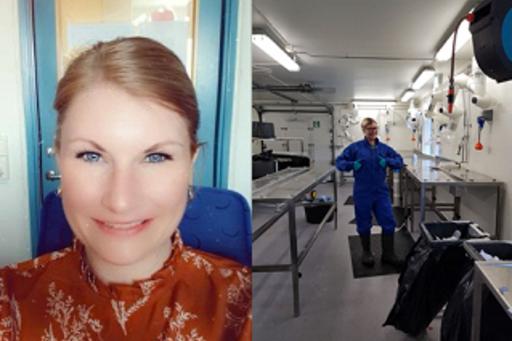
Effects of alternative feed ingredients and environment on nutrient uptake, energy balance and welfare
Short description
My scientific focus is on feeding related physiology such as digestion, nutrient uptake, intestinal barrier functions and appetite regulation. There is relatively little known of fishes feeding physiology and the goal is to contribute with further knowledge to the scientific community. I´m involved in a number projects that are examining alternative ingredients in several species such as wolffish (Anarhichas lupus och minor), Atlantic salmon (Salmo salar) and rainbow trout (Oncorhynchus mykiss).

Challenges:
There is a substantial amount of resources put into finding new alternative ingredients in feed to commercially important species because of fluctuating availability and price of fish meal and fish oil. Today most of the feed is composed of ingredients from land-based agriculture. But, this comes with new problems. One perspective is that these products could be eaten directly by humans. Another is that land-based plants contain anti-nutrial factors that can cause intestinal inflammations if not processed properly. It is there for important to find other alternative ingredients with the right nutritional composition and without detrimental effect on fish health. SWEMARC focus on marine resources such as industry side stream products, algae, mussels and insects. Ingredients from the ocean have a beneficial nutritional profile of amino acids and fatty acids. This not only result in high growth rate and better fish welfare but also in a healthier product for human consumption. Through use of marine ingredients that is not in conflict with human consumption and previously wasted side stream products it support the philosophy of circular economy where nothing goes to waste.
Scientific interest:
- Fish physiology
- Feeding physiology
- Appetite regulation
- Growth physiology
- Stress physiology
- Sustainable food production
On-going research:
- Physiological mechanisms regulating L-lysine transport across the intestinal tissue in rainbow trout (Oncorhynchus mykiss)
- Dietary replacement of fishmeal with new marine proteins recovered from shrimp and herring process waters, promising alternative source in Atlantic salmon aquaculture
- Enzymatic activity and nutrient uptake in Atlantic wolfish (A. lupus) fed a single meal under two different feeding regimes
- Characterization of digestive, absorptive and barrier function of the Atlantic wolffish intestine
Results
Co-author
Ghrelin and Its Receptors in Gilthead Sea Bream: Nutritional Regulation
https://www.frontiersin.org/articles/10.3389/fendo.2018.00399/full
Fish welfare, fast muscle cellularity, fatty acid and body-composition of juvenile spotted wolffish (Anarhichas minor) fed a combination of plant proteins and microalgae (Nannochloropsis oceanica)
https://www.sciencedirect.com/science/article/pii/S0044848618325195